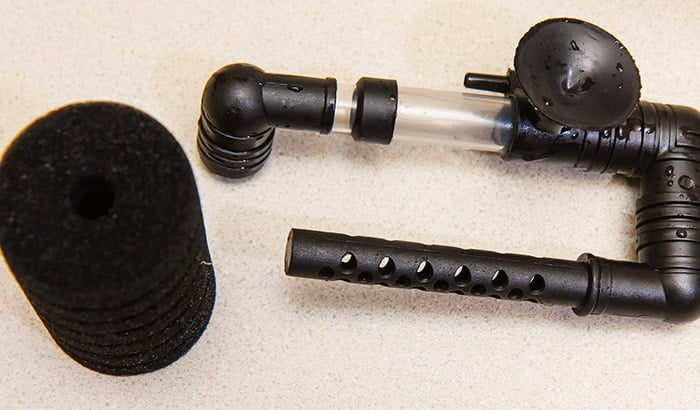A sponge filter is a useful piece of equipment for both fresh and saltwater aquariums. They work by pumping water through a sponge where it is cleaned before returning to the tank. As it catches debris in the process, the sponge filter is an important addition to an aquarium.
This article, National Park Aquarium will explain the different types of sponge filters available, how they work, and when they should be used.
What is a Sponge Filter?
A sponge filter is a type of aquarium filter that is inexpensive, easy to use, and effective. It works by drawing water through a sponge, which traps debris and other particles in the water. Sponge filters are popular among aquarists because they are silent, low-maintenance, and compatible with most tanks.
They are also known for creating gentle currents inside the tank, which is beneficial for certain species of fish.
Sponge filters are commonly used in shrimp tanks as well, as they provide mechanical filtration and can lead to a healthier aquatic environment by promoting the growth of beneficial bacteria in the aquarium.

Sponge Filter Working Mechanism in a Fish Tank
- Sponge filters work by drawing water through small pores or openings and trapping debris and waste particles inside the sponge material.
- The water is then forced back out through an outlet tube or hole, leaving the waste particles inside the filter.
- As the water is forced through the sponge material, it also oxygenates the water, which is beneficial for both fish and plant life. Additionally, the action of the sponge filter can help to circulate water throughout the aquarium.
- The sponge provides mechanical and biological filtration, trapping debris and providing a surface for beneficial bacteria to grow. These bacteria help break down waste products in the water, improving water quality and preventing ammonia and nitrite build-up.
- Effective biological filtration.
- Gentle water flow, suitable for delicate fish.
- Cost-effective.
- Easy maintenance.
- Good for oxygenation.
- Limited mechanical filtration.
- May not be aesthetically pleasing to some.
- Not ideal for very large tanks.
- Bubbling noise may be bothersome in quiet settings.

Sponge Filter’s Use in An Aquarium
In new tanks, it is essential to seed the sponge filter with bacteria from an established aquarium before using it. This will help ensure that the filter is working properly and that the water quality in the new tank is not adversely affected.
Sponge filters can be used in both fresh and saltwater aquariums. However, they are more commonly used in freshwater aquariums because they are less likely to clog with algae and debris.
Sponge filters can be used alone or in conjunction with other filters, such as power filters or hang-on back filters.
When using a sponge filter with another filter, it is crucial to ensure that the Sponge Filter is placed before the other filter in the filtration system. This will ensure that the water is properly filtered and that debris is not sent back into the tank.
Types of Sponge Filter
Sponge filters are one of the most popular filters used in aquariums. They are easy to maintain and provide good filtration for fresh and saltwater aquariums. There are two main types of sponge filters: mechanical and biological.
1. Mechanical Sponge Filters
Mechanical sponge filters work by trapping debris and dirt in the sponge’s pores. This filter is great for removing particulate matter from the water. Still, it does not remove dissolved toxins or waste products.

2. Biological Sponge Filters
Biological sponge filters use bacteria to break down waste products in the water. These filters are very effective at removing ammonia and nitrites from the water, making them ideal for freshwater aquariums. However, they are not as effective at removing dissolved toxins and waste products.

See more:
- The Best Filter for Shrimp Tank
- 5+ Best Canister Filter for 75 Gallon
What Size Sponge Filter Do You Need?
The answer to that question depends on a few factors, including the size of your aquarium, the number of fish you have, and the type of fish you have.
In general, however, you should choose a sponge filter rated for an aquarium that is at least 20 gallons larger than your actual aquarium size.
So, if you have a 10-gallon aquarium, you should choose a sponge filter rated for at least a 30-gallon aquarium.

When it comes to the number of fish you have, it is important to remember that fish produce a lot of waste. A good rule of thumb is to choose a sponge filter rated for an aquarium that is at least twice the size of your actual aquarium.
So, if you have a 10-gallon aquarium, you should choose a sponge filter that is rated for at least a 20-gallon aquarium.
Finally, the type of fish you have can also affect the size of the sponge filter you need. If you have very large or aggressive fish, you will likely need a larger sponge filter than someone with smaller, more peaceful fish.
When in doubt, it is always better to err on the side of caution. Therefore, you should choose a sponge filter that is too large rather than too small.
A sponge filter that is too small will quickly become overwhelmed and will not be able to filter your water effectively. A sponge filter that is too large will simply be a waste of money.
When to Use a Sponge Filter?
There are a few things to consider when deciding if a sponge filter is right for your aquarium. Sponge filters provide mechanical filtration, which means they remove physical debris from the water. They do not, however, remove chemical pollutants or toxins.
Sponge filters are most effective when used in smaller tanks or tanks with slow-moving fish. They can also be used in larger tanks but may need to be replaced more often due to the increased amount of water that needs to be filtered.
Sponge filters are an excellent choice for beginner aquarium hobbyists or those looking for an easy-to-maintain filtration system.
They are relatively inexpensive and easy to set up, making them a great option for first-time fish owners on a budget.
Sponge filters also do not require electricity to operate. Therefore, they are a good choice for those who do not want to use power filters or other electrical equipment in their tank.
Conclusion
The filter is an integral part of any aquarium setup, and it’s crucial to understand how does a sponge filter work to keep your fish happy and healthy. By following the tips we’ve provided, you can ensure that your sponge filter runs properly and keeps your tank clean.
Have you ever had a problem with your aquarium? Let us know in the comments below, and we will try to get back to you as soon as possible. Thank you for reading!




